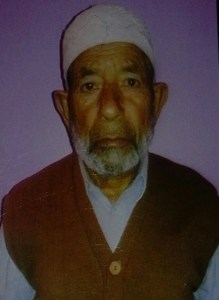Long before the advent of the modern day home health services, a young man in a remote village in Kashmir would go door to door to administer first aid, vaccinations and other immunizations to his community. Ghulam Nabi Bhat (Siraj), now 72 years old, has spent his entire life serving the needs of the town Anantnag, Kashmir. Born in a modest family in the village of Sarnal, Ghulam Nabi grew up in the vicinity of John Bishop Memorial hospital a hospital established during the time of the British rule – and completed 10th grade from the Hanfia High School in town. Soon after, he was involved with the freedom movement of Kashmir and was imprisoned for protesting against the autocratic rule. As fate would have it, it was while Ghulam Nabi spent time in prison that he realized his life’s calling.
After he was released from prison, Ghulam Nabi took the basic medical training course from a medical store run by a local doctor. Under his guidance, he learned how to administer intra-venous and intra-muscular injections. Soon after, he started his own fair price chemist shop in town with nominal charges for his services of doing home visits for injections, wound dressings, and would also vaccinate Hajj pilgrims before their pilgrimage. Ghulam Nabi was very dedicated to serving others and would often visit the sick and needy whenever they needed and very often in the wee morning hours. He would also volunteer his time as a social worker and helped countless families with everything from wedding arrangements to helping arrange a burial.
 Ghulam Nabi quickly became known as the first aid man of the neighborhood. His dedicated service caught the attention of the District Medical Officer of the town and he was eventually recruited as a class 4th employee and assigned to look after the Well-Baby Clinic. The Well Baby Clinic at the hospital was the first stop for every new baby – it was where critical lifesaving vaccinations were administered. In addition to his responsibilities at the clinic, Ghulam Nabi also managed the hospital drug store. While working at the Well Baby Clinic, he got training on how to give vaccines to children. This was also the time when polio was common in Kashmir and Ghulam Nabi saw firsthand the devastating impact the disease could have. He was so moved by the miraculous nature of the polio vaccine that he decided to volunteer his time administering polio drops to children in the community. Ghulam Nabi would make door to door visits to the homes of children who did not come to the hospital despite rain, sleet or snow – to administer the vaccine. Not able to afford a car, he would visit remote villages on foot or horseback selflessly to administer the polio drops. Ironically, his service to children in the community had an unexpected outcome he developed a reputation amongst the children as the ‘injection man’ and often they would try to hide whenever they saw him in the village to avoid getting vaccinated!
Ghulam Nabi quickly became known as the first aid man of the neighborhood. His dedicated service caught the attention of the District Medical Officer of the town and he was eventually recruited as a class 4th employee and assigned to look after the Well-Baby Clinic. The Well Baby Clinic at the hospital was the first stop for every new baby – it was where critical lifesaving vaccinations were administered. In addition to his responsibilities at the clinic, Ghulam Nabi also managed the hospital drug store. While working at the Well Baby Clinic, he got training on how to give vaccines to children. This was also the time when polio was common in Kashmir and Ghulam Nabi saw firsthand the devastating impact the disease could have. He was so moved by the miraculous nature of the polio vaccine that he decided to volunteer his time administering polio drops to children in the community. Ghulam Nabi would make door to door visits to the homes of children who did not come to the hospital despite rain, sleet or snow – to administer the vaccine. Not able to afford a car, he would visit remote villages on foot or horseback selflessly to administer the polio drops. Ironically, his service to children in the community had an unexpected outcome he developed a reputation amongst the children as the ‘injection man’ and often they would try to hide whenever they saw him in the village to avoid getting vaccinated!
Ghulam Nabi’s selfless service was not limited to the town of Anantnag. Secular by nature, he soon volunteered to serve pilgrims (yatris) during the annual Hindu pilgrimage known as Amarnath Yatra – in Kashmir. The Yatra takes place every year in Pahalgam. Pilgrims travel to the Amarnath Cave which is at an altitude of 12,500 feet and can only be reached after crossing over Mahagunas top, a mountain at an altitude of 14,500 feet. Thousands of pilgrims from all over India visit the shrine every year in August. Medical teams are arranged all along the route right from the base camp in Pahalgam upto the cave at different stations- Chandanwari, Pissu top, Sheeshnagh, Mahagunas top, Panjtarni and the cave itself. Ghulam Nabi would volunteer to serve the pilgrims along the route and often be posted at different locations. But despite the challenging terrain and weather conditions, he would never hesitate to serve the pilgrims. When asked what advice he would give others, Ghulam Nabi says ‘always serve others without discriminating between rich or poor or based on religion or creed.’





